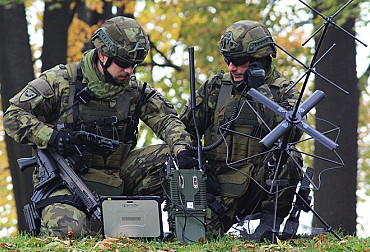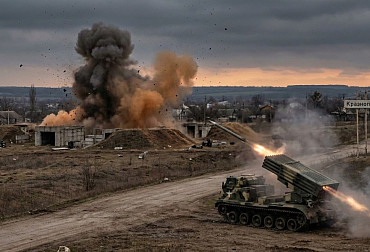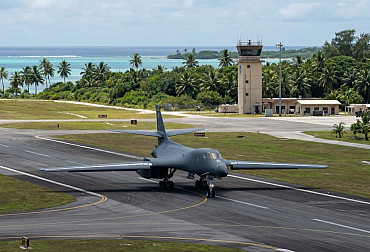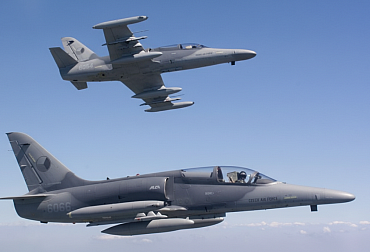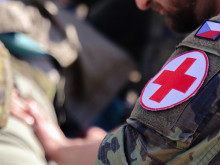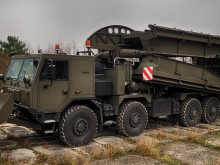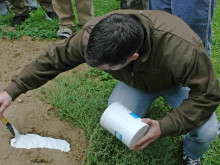We visited the pyrotechnics of the Military Police
As part of the introduction of the Military Police, we have already introduced all 3 headquarters - in Prague, Tábor and Olomouc. Now we would like to introduce a selected specialty that the Military Police has, namely the pyrotechnic service. In order to learn more about this service, we visited the premises of the pyrotechnic group of VeVP Tábor in Jince, where we were welcomed by the chief pyrotechnician of the Military Police (MP), Captain Zbyněk Malkovský, with whom we talked about the pyrotechnic service.
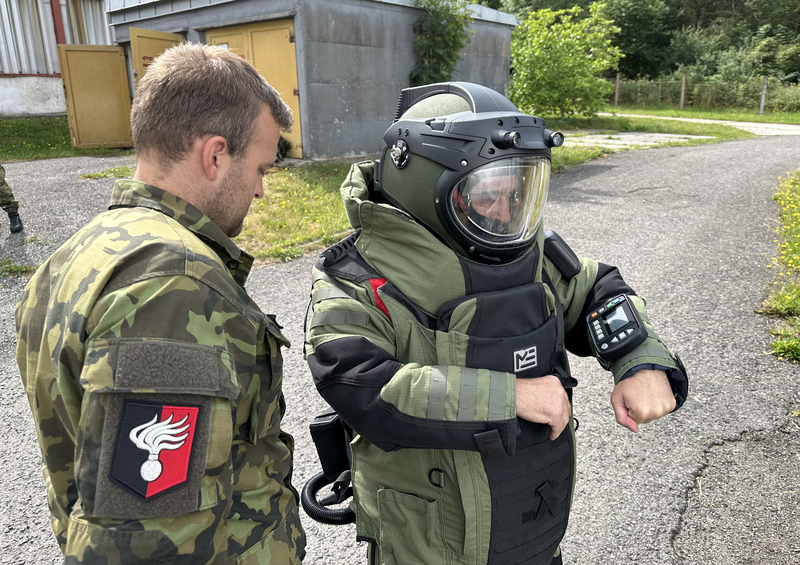
Could you tell us more about the pyrotechnic service?
We are a specialisation that crosses all three Military Police headquarters. The Pyrotechnic Service performs various specific activities, both for the provision of the MP units themselves and for the implementation of MP tasks for the entire Ministry of Defence. These are mainly: training, lectures, demonstrations of activities, public education on how to proceed after finding a dangerous object, providing training or conducting independent training by our instructors. Our activities can be further divided into preventive actions and the actual performance of police pyrotechnics. Within the framework of prevention, we mainly focus on inspections and pyrotechnic inspections. The performance of police pyrotechnics mainly involves the examination and possible disposal of unexploded ordnance found or the resolution of a problem with an explosive device (NVS). We also have a forensic expert in our ranks specialising in ballistics, pyrotechnics, weapons and ammunition. The Military Police has several dozen officers with pyrotechnics licenses, about half of whom are in designated pyrotechnics positions.
How many cases have you handled this year?
So far this year we have dealt with around two hundred pyrotechnic service actions, during which we have searched for just under four hundred pieces of unexploded ordnance. The vast majority of them were destroyed. Over the past five years, that's more than eight thousand pieces of unexploded ordnance that the MP Pyrotechnics Service has dealt with.
Video: We visited the pyrotechnics of the Military Police / CZ DEFENCE
Can you give some specific examples of your recent deployments?
The Military Police maintains a round-the-clock pyrotechnics alert, so we are ready to intervene at pretty much any time, both on found munitions and on NVS. We basically go to unexploded ordnance several times a week. Fortunately, we are in an environment where NVS or the threat of NVS is a rather rare occurrence. At the same time, we are also continuously involved in the clearance of the former Brdy military base, where our bomb disposal technicians are deployed every day with members of the ground forces.
Do you cooperate with the Police of the Czech Republic?
We cooperate with the Police of the Czech Republic on various events, most recently, for example, during the EU Presidency, when preventive pyrotechnic inspections were carried out, as well as during the security of the World Ice Hockey Championship, which was held in Prague and Ostrava. We have worked together in Vrbětice or successfully traced evidence in criminal activities. If the police ask us for assistance, we are ready to meet them to the maximum.
Who else do you cooperate with?
Our cooperation is really diverse, from the above mentioned ground forces of the Czech Armed Forces and the Czech Police, to other units of the Czech Armed Forces, the Fire Brigade, the BIS, the Prison Service, the Customs Service, etc., and always at a completely professional level.
Who activates the pyrotechnics of the Military Police?
Notification of the discovery of unexploded ordnance or the threat of NVS can be made by the finder directly to the phone of the Pyrotechnic Emergency Group or through the permanent operational supervisor of the MP. The process for relaying information and activating the service is further addressed by internal procedures.
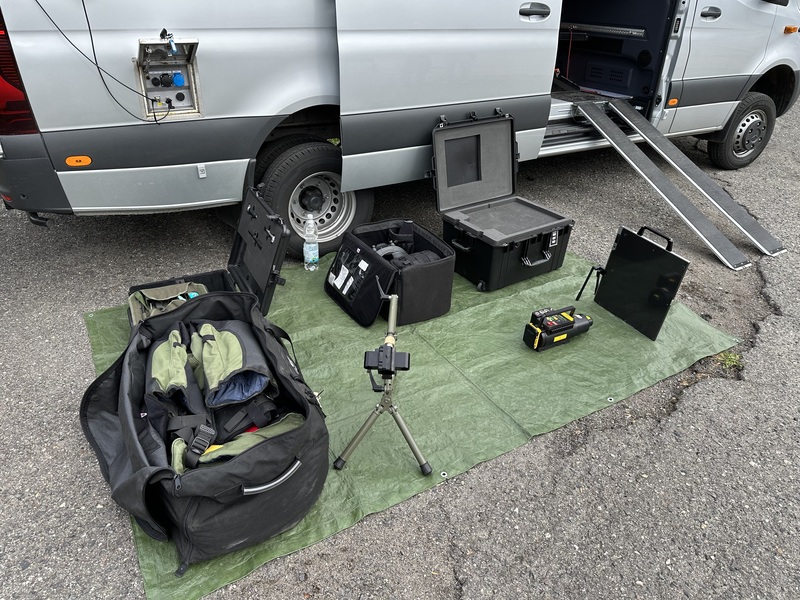
What kind of munitions were found and from what period?
This question cannot be answered unequivocally. It is very diverse, because our scope is within the military units, objects and premises all over the country, and in each part and period there were different troops. Specifically, the Brdy Military Depot here has been used militarily for many decades, so there has been a lot of different munitions accumulated over that time. There are areas that are more specific to certain types of finds, but even that cannot be taken as a rule.
Who decides in an engagement or exercise the perimeter that should be closed so that munitions clearance is accomplished without loss of life or property?
This is always decided by the intervening Chief Bomb Squad who will either recommend to the action commander or, as action commander himself, will determine the parameters of the danger perimeter.
When disposing of munitions, does the Bomb Squad take into account that they could be initiated on site, which means that some material damage could occur?
This is always taken into account, which is why the safety measures are taken. On the one hand, it is the disposal of the munitions found at the site that is the safest way for the bomb disposal technician to eliminate the threat. On the other hand, he must always consider all the circumstances in order to minimize possible damage to health or the surroundings (property) within the framework of his own safety. Fortunately, we are not so concerned with finds or threats in populated areas where mass evacuations of civilians are required. Due to our activities, there is no problem, for example, with the possible evacuation of part of a military unit. We must always take the danger area into account.
Has the system of work of the bomb disposal technicians changed over time in terms of the use of different equipment, etc.?
Of course, we are trying to move with the times as much as possible and equip our service with modern means, whether in terms of technology, material or mobile means. I believe that we are succeeding in this and currently have a pyrotechnics service equipped to a very good standard.
What protection does a pyrotechnician have when carrying out an intervention to avoid injury or, God forbid, loss of life?
First and foremost, it is his tactics and procedure at the scene of the intervention. There are a few principles that every pyrotechnician should follow. Then, of course, there are the possible means such as the pyrotechnic suit (we will see this later), the radio signal jammer, remote handling, etc. Last but not least, we also need a piece of luck.
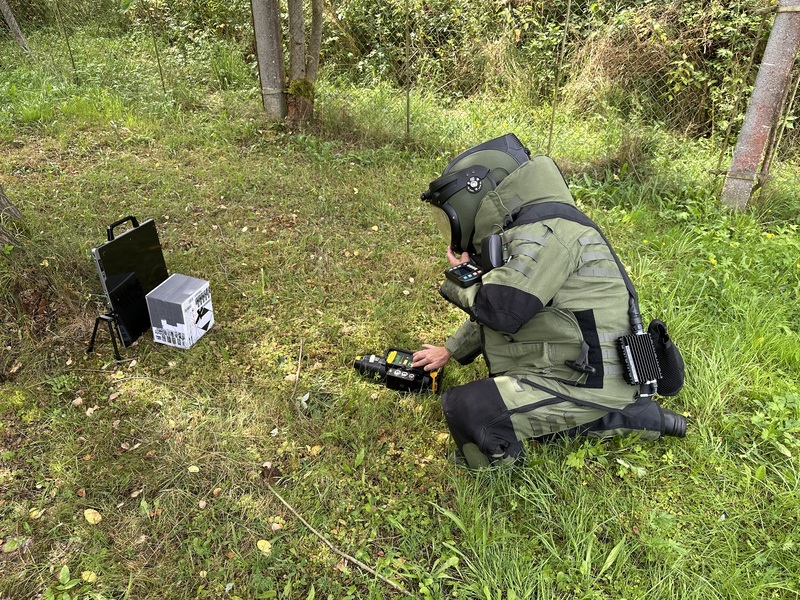
How many members does the EOD team have and who decides on the procedure for dealing with the situation - the EOD technicians themselves on site or a higher level of command)?
It depends on the type of intervention. Our standard composition of the group is two members - one leading pyrotechnician, the other in the position of pyrotechnician (technician), who takes care of technical means as a priority. This group can be expanded with the additional number of pyrotechnicians required if necessary. It is certainly worth consulting with the other colleague to resolve the situation on site. However, the final course of action is always the responsibility of the Lead Bomb Technician. If it is a larger intervention, where the commander of the measures is not the pyrotechnician, then the lead pyrotechnician also acts as an advisor, determining and proposing safety measures based on the threat.
Are there any manuals or standard procedures that pyrotechnicians are taught?
Yes, during pyrotechnic education and subsequent training, these procedures are instilled in pyrotechnicians. A lot of it has to do with safety principles and technical procedures with the devices in question. However, most incidents are completely individual and one must be able to be creative and use one's own judgement, which one then translates into practical action in the context of the intervention, all of course while maintaining maximum safety for oneself and the environment. There is no clear-cut manual for every situation that a pyrotechnician will deal with.
Can a bomb disposal technician, after a personal assessment of the situation, refuse to continue with the activity on the grounds that, for example, he is not confident in the situation and his life could be endangered? Does he or she have the option of consulting a colleague?
He/she may refuse for several reasons, e.g. health reasons (fatigue, nausea, etc.) or he/she may assess the situation as not being manageable. In this case, this bomb technician would be replaced by another or another bomb technician would reinforce the intervening group. In the nearly 15 years of the MP Bomb Squad, we have not had to deal with this. As regards the second part of the question, during an intervention, the lead pyrotechnician can communicate with his colleague by means of communication, unless there is a risk of activating a dangerous device by radio signal or other means of communication. At the same time, the intervening group may be equipped with a video transmission where both can jointly assess the threat and determine the subsequent tactical course of action.
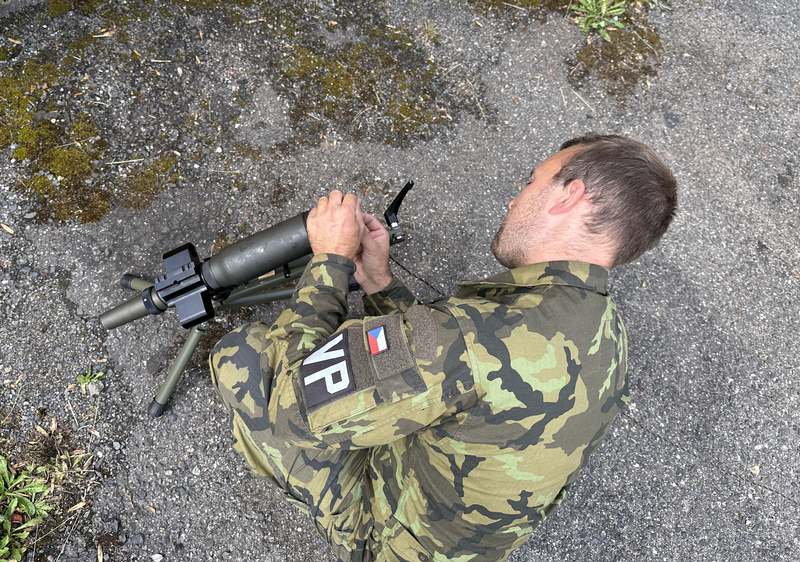
Is the robot used only after a previous physical monitoring of the object by the lead bomb disposal technician or is it sent to the explosive or suspicious object first?
There are no strict manuals for these situations. All the circumstances for the possible use of the robot, such as the environment, the size of the threat, the location, the area at risk and, of course, the capabilities of the robot itself, must always be assessed on site. The successful execution of the intervention is the responsibility of the lead bomb technician, who determines the procedures and resources to be used, and a bomb robot may be one of them.
What specific cases are you called to?
Finds of unexploded ordnance outweigh the threat of IEDs, although one might conclude from the media or various pyrotechnic demonstrations that the opposite is true.
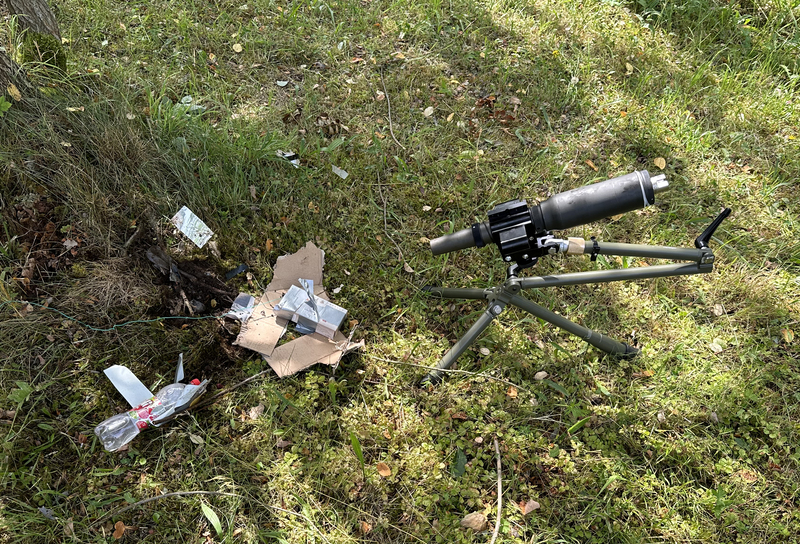
What does a military police officer have to meet in order to join the bomb squad?
He must meet the basic requirements, such as age, sanity and criminal integrity, which he already meets by being a military policeman. Furthermore, he must pass a separate psychological and medical examination to perform this specialty and complete a very demanding pyrotechnics course, which is the same as for the Army's pyrotechnicians. Last but not least, he must also have the desire to perform this specialty.
Is there any interest in the pyrotechnic service?
We would certainly welcome more interest than there is now. At the moment, we are quite full, but a huge exclamation point at the moment is the age of our pyrotechnicians. If the Army claims that its average age of 37 is very high, our average age is much higher. In the event of a mass exodus, it will be very problematic indeed to replace the bomb techs in a short period of time (several years).
Would it be a personnel solution for you to work with active reserve soldiers?
No, definitely not. This is such a specific area that I can't imagine a format for involving active reserve soldiers in the execution of the MP pyrotechnic service at this time.
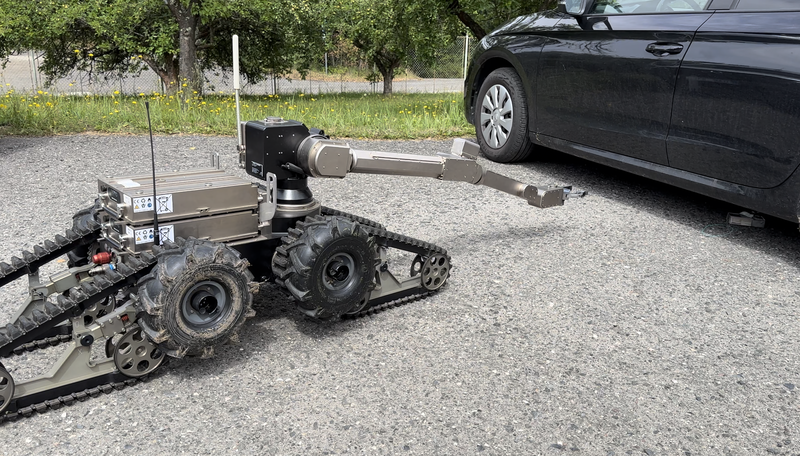
How often do Military Police pyrotechnicians train?
We train basically every day. As the service is equipped with a large number of technical devices, it is essential that everyone knows how to operate them perfectly, and this must of course be constantly trained. Working with metal detectors, analysers, robots, X-ray systems, etc. is really technically very demanding. Of course, it's not just about pressing buttons and operating a joystick, for example, such training in putting on and using a pyrotechnic suit is really worth it. This suit weighs more than 40 kilos and severely restricts a person's musculoskeletal system.
We also prepare on a theoretical level, where we take part in certain instructional methodical jobs (IMZ) and practical exercises.
Do you participate in foreign pyrotechnic exercises to improve your skills and share experiences?
Our participation abroad has been very limited so far. We do not regularly participate in any foreign exercises, but personally I would like to see us become much more active in this over the coming years. Our own lack of language skills may be a limitation. In recent years we have had the opportunity to send several of our bomb disposal technicians on foreign courses. Each of these courses has been a tremendous enrichment of knowledge and experience, not only for the individual who has successfully completed it, but also for the entire pyrotechnic service.
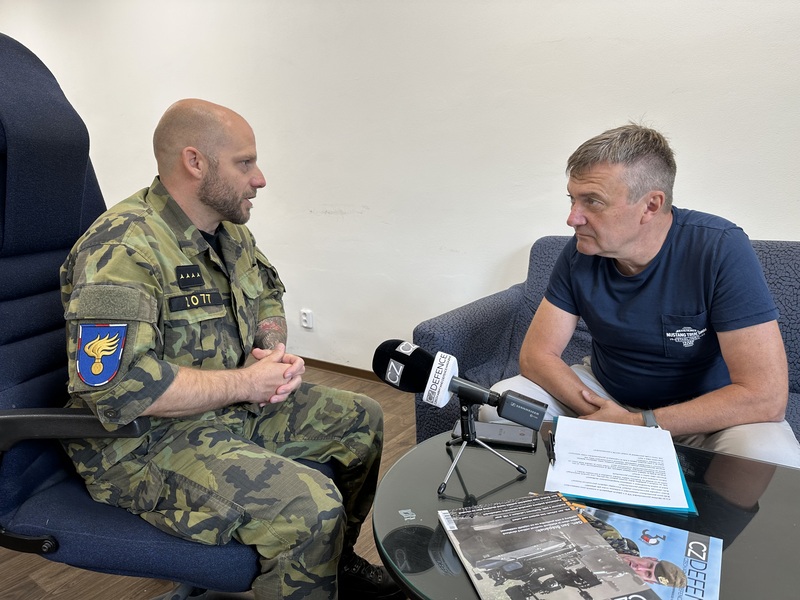
Is there anything in particular (equipment, gear, armament) that you would like to have at your disposal as a pyrotechnic service or are you satisfied with the current equipment?
We are basically satisfied because we are really trying to follow the trend and equip the pyrotechnics with modern equipment. We are limited by the acquisition processes, so we know that we may not receive a given piece of equipment we want to acquire until two years from now, where the technology has already been advanced again. We are currently working on the purchase of unmanned aerial vehicles for the Bomb Squad to provide a secure perimeter for munitions disposal.
During our visit we also had the opportunity to see the pyrotechnical equipment of the pyrotechnical emergency group and to watch a demonstration of the pyrotechnician's work (for the presentation we would like to thank the senior inspector of the Pyrotechnical Group of VeVP Tábor, Battalion. Ivo Hoffman) wearing the EOD 9 protective suit, who first X-rayed the threat, then analyzed the contents on the monitor and then deactivated the mock explosive system by means of a water jet from the sprinkler. The dynamic demonstration also included work with a medium-sized Telemax PRO pyrotechnic robot.











